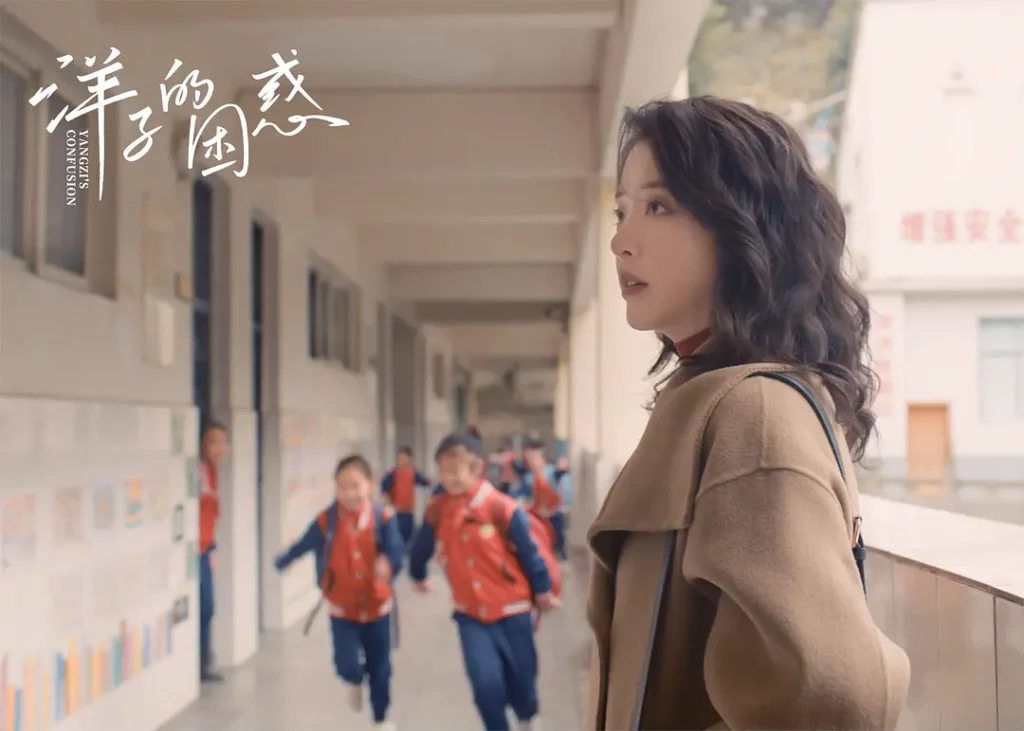Mint Chinese Film Festival 2024, taking place from February 1 to 4, is one of the most influential film festivals for Chinese cinema, casting attention on independent, transnational, and female-focused productions.
Elena Xiang reviews Yangzi’s Confusion by director Jue Li, which portrays a young girl grappling with the discovery of her abandonment through her mother’s stolen diary, revealing a nuanced struggle entwining three generations of women in suffocating East Asian family dynamics. The film was officially selected by Pingyao, Beijing, Jeonju, and the First International Film Festival.
Yanjin County, situated along the Heng River on the border between Yunnan and Sichuan Provinces in China, is known as the narrowest city around the world. This distinct natural landscape unfolds as the camera tracks Meihui (Xiaolei Huang) navigating her hometown’s constricted alleyways and secluded mountain roads. Typically, small-town settings in films evoke feelings of solitude, limitation, and resignation, elements that are palpably absent in bustling urban environments. This backdrop becomes a canvas for Chinese directors like Lou Ye and Jia Zhangke, whose works often portray characters ensnared by the stasis of small towns forgotten by time.
Contrary to this norm, Meihui embodies constant motion, reminiscent of protagonists in French New Wave cinema, her vivid blue coat a beacon in the dreariness. Her discordance with the surroundings patriarchal norms makes her a figure of rebellion and misunderstanding. Through the voiceover of Yangzi (Yayun Zheng), Meihui’s daughter, reading from the diary she stole, we glimpse Meihui’s past: a high school dropout who later worked in different places, a divorcee who relinquished her daughter’s custody shortly after birth, and currently, a successful businesswoman of a local curtain store.
Meihui’s familial interactions, especially with her estranged parents, underscore the film’s exploration of traditional familial and marital roles. Meihui’s parents live in rural areas and separated a long time ago. Her mother didn’t remarry (while her father shortly did) and preferred living alone. The scene when Meihui visited her mother summarised the awkward relationship between an indifferent, unaffectionate mother who refuses to accept her daughter’s care (‘don’t waste money’- a phrase so often uttered by Asian parents) and a daughter who no longer knows how to communicate. Two characters never appear in the same frame when eating together, and the emotions are implicitly expressed by the Kunqu opera singing from the old television in front of the characters. Despite Meihui’s financial success, her value in her family’s eyes was worth much less than her brother, who merely produced a male offspring to ensure the so-called continuation of family bloodline.

Meihui fundamentally distrusts this long-held marital and family structure from the environment in which she grew up. Although her final decision to seek a divorce later in her own life has more underpinning factors (many hints pointing toward postnatal depression), one of the most important reasons lies in Meihui’s pursuit of her own career and her refusal to become a family-type woman under traditional social expectations. Meihui is not the ideal mother in the mainstream narrative. She is flawed. She gives up her daughter’s custody and only picks her up once a few weeks; her attempt to reconnect with her daughter never results in complete success. But as she works hard to prepare the money for Yangzi’s education, Meihui expresses love for her daughter in her own way, something she barely learned from her mother – Meihui wishes not for Yangzi to repeat her destiny.
The final scene on the round table is a strategic parody of a Chinese aesthetic happy reunion that very much reminded me of An Lee’s The Wedding Banquet and Lulu Wang’s Farewell, where tragedy is embedded in a seeming comic scene. Everyone in the family is planning something, forcing their will upon the others. Meihui’s brother wants his mother to sell her old house, where she lived alone and symbolically represents her independence, to help him buy a new one. Meihui’s father and stepmother force their presence at Meihui’s mother’s birthday party to downplay the awkwardness of their long-before division. The father cares more about his own image rather than the celebration of his ex-wife’s sixtieth birthday. It shows how ‘saving face’ (shout out to Alice Wu) is still more important than anything for many Chinese. Peace, even on the surface, is worth an individual sacrifice.
When Meihui’s ex-husband, obviously out of Meihui’s expectation, also appears at the round table, the film points out how divorce in rural areas is legally applicable but culturally invalid. The stigma will forever label divorced women still as someone’s wife or mother. In a country where the divorce rate has doubled in decades, divorced women still face enormous discrimination, misunderstandings and judgement. Women seem to be forever bound to a somewhat intact or broken family structure that, no matter how hard they try, will never be able to escape from.
The film’s title, Yangzi’s Confusion, aptly captures the protagonist’s bewilderment amidst adult complexities, her premature contemplation of her mother’s and grandmother’s resignations. Yangzi is confused and should be forever confused. But when gazing over the hot pot steam, which blurs her mother’s face, who is sitting alone, she somehow surpasses the boundaries of time and space and starts to forgive Meihui for everything she has done that seems wrong in a conventional sense. What connects them is not motherhood/daughterhood, but the same massive, unnamable oppressions pressing upon more than three generations of Chinese women.
The film provides a hopeful ending, with Meihui and Yangzi taking out a birthday cake to finally celebrate their grandmother’s birthday, something the father and the son in the family have ignored in their eloquence and drunkenness. It’s the first time three women have appeared in the same frame. This ending is not merely a resolution to the film’s plot but a profound commentary on contemporary Chinese society’s evolving dynamics of family, tradition, and individuality. ‘Yangzi’s Confusion’ concludes on a note of optimism, suggesting that change is possible and that the uncertain future holds the promise of liberation and understanding.




